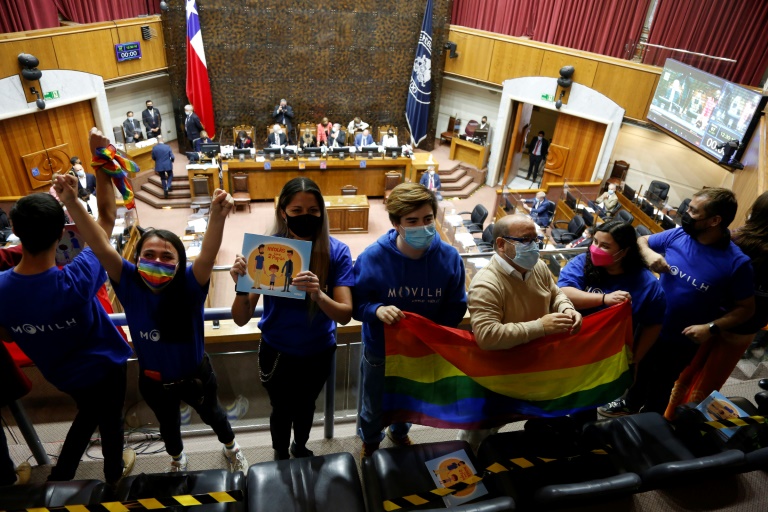
VALPARAíSO (CHILE) - Chile's congress on Tuesday approved a long-awaited bill to legalize same-sex marriage, joining just a handful of countries in majority Catholic Latin America with similar laws.
The measure, which will also enable married same-sex couples to adopt children, has the support of President Sebastian Pinera, who must sign it into law.
Cheers erupted in the chamber and people waved LGBTQ flags when the bill was approved after a process of some four years.
"I am tremendously moved. I am finding it difficult to keep my composure. It's been a long race," said Isabel Amor of the Fundacion Iguales rights group, who was in the chamber for the vote.
LGBTQ rights group Movilh said the move was "an historic and decisive step" for same-sex couples and parents "who, without exception, were being discriminated against."
The bill got the green light from the upper house of congress, or senate, on Tuesday, and was immediately given the final stamp of approval by the lower Chamber of Deputies, with 82 votes to 20.
There were two abstentions.
- 'I do' -
In Latin America, same-sex couples could until now get married only in Costa Rica, Ecuador, Colombia, Brazil, Uruguay and Argentina, as well as in 14 of Mexico's 32 states.
Chile legalized same-sex civil unions in 2015 and has been awaiting the passing of the marriage bill since then-president Michelle Bachelet sent it to congress in 2017.
In a surprise move, her conservative successor, Pinera, announced in June he would seek the urgent passage of the bill -- supported by a majority of Chileans -- through congress.
The project has been consistently opposed by the most conservative bloc of Chile's ruling right wing, but has nevertheless obtained a majority "yes" vote at every step of the process in an opposition-dominated congress.
The issue deeply divides the two candidates headed for a presidential run-off on December 19.
Gabriel Boric, 35, who represents a leftist alliance that includes the Communist Party, supported the bill and voted "yes" in his capacity as lawmaker.
But 55-year-old, far-right candidate Jose Antonio Kast, who won 28 percent of first-round votes compared to Boric's 26 percent, campaigned against it.
Kast, who also opposes elective abortion, has since softened his vocal opposition to same-sex marriage, as he tries to attract voters from the center.
Last week, Chile's congress shelved a bill to decriminalize abortion, pending an edit of the text, effectively putting it on ice for at least a year.
The marriage bill was delayed on the same day to iron out differences of legal interpretations of certain technicalities.
The necessary adjustments were made over the past week by an expert committee of senators and lower house deputies.